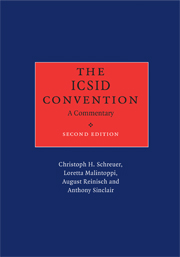Book contents
- Frontmatter
- Contents
- Foreword by Professor Sir Elihu Lauterpacht, CBE, QC
- Authors' preface to the second edition
- Table of cases
- List of abbreviations
- Text of the ICSID Convention
- Procedural calendar
- PREAMBLE
- CHAPTER I International Centre for Settlement of Investment Disputes
- CHAPTER II Jurisdiction of the Centre
- Article 25 Jurisdiction
- Article 26 Exclusive Remedy
- Article 27 Diplomatic Protection
- CHAPTER III Conciliation
- CHAPTER IV Arbitration
- CHAPTER V Replacement and Disqualification of Conciliators and Arbitrators
- CHAPTER VI Cost of Proceedings
- CHAPTER VII Place of Proceedings
- CHAPTER VIII Disputes between Contracting States
- CHAPTER IX Amendment
- CHAPTER X Final Provisions
- Final Clause
- Consolidated bibliography
- Index by article
- Index by subject
Article 25 - Jurisdiction
from CHAPTER II - Jurisdiction of the Centre
Published online by Cambridge University Press: 07 September 2010
- Frontmatter
- Contents
- Foreword by Professor Sir Elihu Lauterpacht, CBE, QC
- Authors' preface to the second edition
- Table of cases
- List of abbreviations
- Text of the ICSID Convention
- Procedural calendar
- PREAMBLE
- CHAPTER I International Centre for Settlement of Investment Disputes
- CHAPTER II Jurisdiction of the Centre
- Article 25 Jurisdiction
- Article 26 Exclusive Remedy
- Article 27 Diplomatic Protection
- CHAPTER III Conciliation
- CHAPTER IV Arbitration
- CHAPTER V Replacement and Disqualification of Conciliators and Arbitrators
- CHAPTER VI Cost of Proceedings
- CHAPTER VII Place of Proceedings
- CHAPTER VIII Disputes between Contracting States
- CHAPTER IX Amendment
- CHAPTER X Final Provisions
- Final Clause
- Consolidated bibliography
- Index by article
- Index by subject
Summary
INTRODUCTION
General
Art. 25 lays down the general parameters for ICSID's activity. It is the first of three articles in Chapter II, which is headed “Jurisdiction of the Centre”. The other two articles deal with the much narrower questions of excluding other remedies (Art. 26) and diplomatic protection (Art. 27). Unlike Arts. 26 and 27, Art. 25 is not restricted to arbitration but refers to “The jurisdiction of the Centre” thereby also encompassing conciliation (see also paras. 19–28 infra). Art. 25 sets out the preconditions for the operation of Chapter III (Conciliation) and Chapter IV (Arbitration).
Art. 25 only deals with the substantive questions of jurisdiction. The procedure for the determination of the Centre's jurisdiction is regulated in Arts. 28(3) and 36(3), dealing with the Secretary-General's screening power, and in Arts. 32 and 41 which make the conciliation commission or the arbitral tribunal the judges of their own competence.
Art. 25 contains requirements relating to the nature of the dispute (ratione materiae) and to the parties (ratione personae). In addition, the parties must have given their consent. The requirements relating to the nature of the dispute are that it must arise directly from an investment and that it must be of a legal nature. Those relating to the parties specify that one side must be a Contracting State and the other a national of another Contracting State. All other parts of Art. 25 either define or otherwise specify these essential requirements.
- Type
- Chapter
- Information
- The ICSID ConventionA Commentary, pp. 71 - 347Publisher: Cambridge University PressPrint publication year: 2009
- 2
- Cited by



